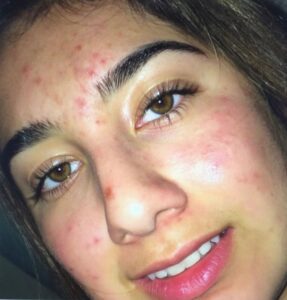“When I got my first period, I thought I was dying.”
Meet Erika. She’s one of the five million women living with PCOS. Those were the exact words she used to describe her first menstrual cycle.
PCOS, which stands for polycystic ovary syndrome, is a common endocrine disorder that affects women of reproductive age. It’s characterized by irregular periods, excess androgen hormones, and polycystic ovaries.
Erika was 20 years old when diagnosed with the disorder. But in hindsight, the signs had been there for years. “My first period was a nightmare,” she said.
She had flu-like symptoms, including nausea, chills, headaches, and exhaustion, to name a few.
And as time passed, her periods didn’t get easier.
Her cycle remained irregular, heavy, and painful.
Acne: A Common PCOS Symptom and Emotional Struggle
In addition to periods that were a complete nightmare, Erika also experienced a slew of other uncomfortable and, sometimes, embarrassing symptoms. One of her most difficult problems was acne.

Acne, which occurs when sebum (oil) clogs the hair follicles under the skin, is closely linked to the high androgen levels often found in women with PCOS. These androgens drive the overproduction of sebum, which in turn exacerbates acne.
For many women with PCOS, acne is a persistent and distressing symptom that extends beyond physical appearance. Erika was no exception.
Her constant battle with acne took a significant toll on her self-esteem and emotional well-being.
The PCOS-Birth Control Rollercoaster
Erika struggled with painful periods for two years and felt increasingly insecure about her skin, despite trying several prescribed acne topicals, home remedies, and skin treatments. When she finally accepted that nothing was working, she made an appointment with her doctor, hoping to gain some insight as to why her skin was breaking out.
Instead, she was presented with the idea of getting on the pill.
Without receiving a warning about potential side effects, she accepted her doctor’s solution and left the office with her first birth control prescription: Ortho Tri-Cyclen.
With optimism, Erika started taking birth control as her doctor prescribed. It cleared her skin and made her periods more manageable.
The problem?
- 20lbs weight gain and water retention
- Depression
- Mood swings
- Bloating and other digestion problems
While her original problems were solved, Erika had an entirely different set of issues to deal with.
After about ten months, with no improvement in her symptoms, she returned to her doctor.
One 10-minute appointment later, Erika left with a prescription for a different birth control pill: Yaz.
While taking Yaz, Erika lost the water retention and weight she gained on Ortho Tri-Cyclen. Her periods were still regular and light, and she liked that she could “skip” her periods with Yaz.
However, the added side effects were not worth it.
While taking Yaz, Erika noticed her hair falling out.
Her acne returned; she had dry skin, no appetite, anxiety, and high triglycerides.
@erika.hoang This happened when I took YAZ. It’s been years and my hair still hasn’t fully recovered. #yazbirthcontrol #hairlossjourney #birthcontrolsideeffects #birthcontrolhairloss #girltips #birthcontrolproblems #birthcontrolpill ♬ original sound - Braden Bales
After losing half her hair and the remainder becoming significantly thinner, she confronted her doctor about the side effects she was experiencing.
Her doctor dismissed her, claiming that her symptoms weren’t from the pill and that her body needed time to adjust to the new hormones.
Going off the Pill for the First Time
After two failed attempts with birth control, she decided that her mental health was most important. She figured she’d rather have acne and irregular periods than be depressed, anxious, and 20 pounds heavier.
She also thought that her cycle and hormones would be more manageable due to the time passed.
While she started to feel like herself again and her hair grew back, she struggled with mild acne, face puffiness, and migraines. She also lost her period.

Getting a PCOS Diagnosis
After a year off of the pill, Erika still hadn’t gotten her period. She knew something was wrong, so she visited her doctor.
An ultrasound revealed that her ovaries were covered in cysts.
The diagnosis? PCOS.
Her results showed elevated testosterone and cortisol levels, confirming the diagnosis: PCOS.
During a brief conversation about her condition, her doctor informed her that there was no cure.
She also got the same “We can discuss it further when you want to have kids” spiel that many women with PCOS get when they receive their diagnosis.
Her doctor told her that she could take birth control in the meantime.
After explaining her previous birth control experience, her doctor assured her that this one would be different. Feeling hopeless and quite hesitant, she left with a prescription for Lo Loestrin Fe.
Hesitant but not knowing better, she left with a prescription for Lo Loestrin Fe.
Most women aren’t given many options aside from birth control to treat PCOS symptoms.
But like every prescription medication, birth control often comes with side effects. Many women, including Erika, trade PCOS symptoms for new problems.
Lo Loestrin Fe made her period shorter and more regular. But it also caused hair loss, cramps, moodiness, irritability, crying spells, and worsened acne.
Every time she went to her doctor for help, she left with a different birth control prescription, leading to new side effects.
She was stuck in a cycle of weight gain, mood swings, digestion problems, and acne.

The cycle continued for almost a decade until she finally decided enough was enough. The last pill she tried didn’t balance her hormones; she got migraines, recurrent yeast infections, was losing hair, and felt like a shell of herself.
She decided to take her health into her own hands.
Becoming Your Own Health Advocate
As many women with PCOS admit, Erika was dissatisfied with the diagnosis process and the information her doctor gave her about her condition.
“As I reflect on my experiences with these doctors, it’s now so apparent that I was nothing more than a 15-minute appointment in their day. None of them were willing to take the time to address the root cause of my symptoms or offer alternatives to the pill.,” she said.

It's now so apparent that I was nothing more than a 15-minute appointment in their day. None of them were willing to take the time to address the root cause of my symptoms or offer alternatives to the pill. -Erika
In March 2023, Erika decided to stop taking birth control for good. She takes hormone-supporting supplements and monitors her progress using the Home Test Box PCOS Screening.
She is also seeing a functional medicine doctor and giving herself time to heal.
Today, Erika’s goal is to help other women struggling with PCOS and side effects from the pill to feel less isolated in their experiences.
To learn more about her story, follow her Tik Tok Account, where she documents her journey coming off the pill with PCOS.
@erika.hoang Coming off of the pill with PCOS! I’m nervous but excited 😅 Stay tuned. #pcos #pcosawareness #hormonalbirthcontrol #hormonalbirthcontrolsideeffects #hormonalimbalance #comingoffbirthcontrol #comingoffthepill #birthcontrol #velivet ♬ I Think I Like When It Rains - WILLIS





